#the problem lies in the fact that anyone who might be able to help peer-wise I absolutely don't fucking trust lmao
Explore tagged Tumblr posts
Text
*sigh* I think. I think I'm gonna have to find somewhere to Talk About It.
#not HERE obviously God no#but like. somewhere.#because this particular issue is. for real ruining my ability to do anything.#I would like to not routinely cry over it at 3 am and I would like to not avoid doing so many things that are important to me because of it#and I'm making it a part of therapy but sometimes you just...need to talk to a peer and not a medical professional#my therapist is wonderful but they aren't a substitute for an equal relationship and same-page full human connection#the problem lies in the fact that anyone who might be able to help peer-wise I absolutely don't fucking trust lmao#I feel like there isn't a single person who would hear me out without either abandoning me or permanently backing off on our friendship#and maybe that's not fair but I feel like I don't have the luxury of fairness anymore
2 notes
·
View notes
Text
Birth Chart
This birth chart report shows the positions of the planets for Li . The Sun represents vitality, a sense of individuality and outward-shining creative energy. Sun in Virgo It is rare to find the stereotypical nitpicky, exacting, "clean freak" in modern-day Virgos. Although the sign of Virgo has evolved with the times, there are some unmistakable traits that remain. Virgo people are generally respectable, hard-working individuals who have a love of knowledge and know-how. Virgo's symbol, the Virgin, shows itself in the lives of Virgos through a love of all that is "natural" and a certain purity of spirit that keeps Virgos self-sufficient and self-contained, at least on the surface. Virgos are sensitive to their surroundings, and they tend to embarrass easily. They are generally reticent when faced with anything or anyone new. However, once they feel comfortable, they can talk up a storm. Many Virgo Suns are not too comfortable in the limelight. These types are just fine living in the background, as long as they feel useful and appreciated. Solar Virgos have a strong sense of responsibility. Even when they've convinced themselves to be irresponsible about something or the other, they worry about it. Not all Virgos are workaholics. However, when Solar Virgos are not involved in some kind of project, there is generally a vague feeling of discontent. Even when their lives are filled up with work, they are restless and somewhat nervous creatures. The fear of under-performing is often strong. Virgos want to do things well. Some are exacting and thorough, and those Virgos who have convinced themselves to do a less-than-perfect job will generally feel incomplete. There's an odd combination of the intellectual and the practical in Virgo that is sometimes mistaken for coolness. In fact, Virgos are often self-effacing and shy. They'll brush off your compliments quickly and, sometimes, critically; but don't let that fool you. They need your respect and appreciation. In fact, the happiest Virgos are the ones who feel appreciated and useful. Add plenty of worthwhile projects to keep them busy, and Virgos can be some of the sweetest, kindest people around. Keywords: analytical, intelligent, reserved, critical, helpful, conscientious. Virgo ascendant Cancer Sun in III You need activity and a change of scenery often, or you feel restless. You take pride in your mental agility and your friendships. You are able to adapt quite easily to whatever environment you're in. There is a strong need to communicate your knowledge to others and to learn. Your curiosity is endless. Take pride in your intellectual or communicative abilities without feeling the need to lord it over others or to always be "in the know". You have a solid grasp of facts. You have a strong influence on your peers. -212 Opposition Sun - Jupiter Although your intentions are generally good, you are given to overdoing things. You can easily gloss over realistic details and get yourself into debt, overindulge in pleasures such as food and drink, and promise more than you can deliver. For the most part, you find help for your excesses. Somebody's there to bail you out, as plenty of people believe that your heart is in the right place. Generally, this is the case, but if excessive behavior becomes a pattern, and you continually face light consequences, there is the danger that you will not learn from your mistakes and abuse the "system", relying on your friends and family to help you out a little too often. Your reputation for being "good people", thus, can eventually be used to further your purposes--something that should, of course, be avoided. However, many people with this aspect don't fall into the trap of losing their sincerity. You are generous, helpful, and charitable. Still, the tendency to live beyond your means is a real threat that you might struggle with much of your life. Another thing to watch for is depression. You tend to go through periods of intense highs when you are excessively optimistic. These periods are so marked that they seem to be unnatural and a fall seems to be inevitable. You can make promises you intend to keep, but have a problem with follow-through. Self-control can be a real problem. Try to avoid gambling altogether. Usually quite knowledgeable and generous with your time, you have many talents that you might take for granted. 77 Sextile Sun - Ascendant It is easy and natural for you to be received well by others. There is a distinct air of authority and magnanimity surrounding you. The authority you project generally doesn't offend others, generally because sincerity is sensed at the same time. Most people would describe you as natural, easy to like, and friendly. You may have a marked interest in the performing arts and/or sports and games, both as a spectator and participant. This is an especially favorable aspect to have for those who are in the public eye. The Moon represents the emotional responses, unconscious pre-destination, and the self-image. Moon in Taurus Familiarity is important to Lunar Taureans. These people are earthy and strong-willed. They feel with their senses and they are pretty much rooted in their ways. They revel in material comforts--in fact, building a solid and comfortable home and foundation helps to keep them feeling safe and content. It isn't wise to try to push Lunar Taureans into doing anything, but once they have made a commitment, they're persevering. There's a steadiness to this position of the Moon that is comforting to those close to them. But the conservative streak in these natives can be maddening to more progressive personalities. They tend to go out of their way to avoid "messy" or unpredictable situations, crises, and emotional displays. Instead, they focus on creating a reliable and secure life around them. In relationships, Lunar Taureans may not easily recognize their partner's need for change, growth, or emotional stimulation. Moon in Taurus natives are generally very romantic. Their affections are strong, deep, and unwavering. They are sentimental and warm. Since Taurus is a practical earth sign, the placement of the Moon in this sign suggests an ability to protect themselves and their own interests. They will rarely make a move without first determining that it is safe and that there's something in it for them. Generally, Taurus Moon people have reliable instincts. They are very much tied to the physical world, and they often have a particularly well-developed sense of smell. Relationships with people born with this position of Mars are often quite enduring. Many Mars in Taurus people hang onto their mates, even in the face of serious conflict. Taurus is a fixed sign, so break-ups don't happen easily. There is a serenity to them that is calming. In fact, it takes a lot to really get to them. However, they do get off-center every once in a while. They are not the most adaptable people when their own routine is interrupted, for example. Though some Lunar Taureans might be considered anal, most simply have a stubborn streak that keeps them rather resistant to change. Rarely are they spontaneous sorts. Uncomfortable with surprises, these natives value stability. Their needs are strong but quite simple at the same time--they love the "good things" in life. The world of the five senses is all-important to these natives. Their love of stability and steadiness can make them slaves to routine. However, they are loyal and capable people. Short description: Sweetness itself. Convinced of their ideas and strong-willed. He is foresighted and willful. He knows how to trust. He appreciates all the good things in life. He appreciates and protects Nature. Weaknesses: excesses in pleasure, laziness, sensuality, thoughtlessness. Moon in XI Lots of friends, relationships. He makes friends easily and uses his relationships to further professional success. Feelings of friendship are sometimes superficial. Often, lots of children. This position of the Moon indicates an emotional need for a feeling of belonging with, and support from, friends and associations with groups. You look to acquaintances for support, and offer the same in return. A changeable or unstable social life might be a reflection of inner emotional unrest. Waxing and waning feelings for others can cause problems in your relationships. You are a person who is filled with many dreams, wishes, and hopes for your future, and most of these are altruistic and good-hearted desires. However, you might change your aspirations frequently, with your changing moods, and have a hard time settling on goals to work towards as a result. 370 Sextile Moon - Jupiter He is generally pleasantly composed, due to an inner sense of harmony and emotional balance. He is optimistic--and realistically so, most of the time--which contributes to his overall "luck". He is able to get a real perspective on emotional matters that not only benefits his outlook, he is able to offer support to others when needed. Broad-mindedness is a wonderful characteristic. Quick to find humor in situations, he is generally warm and fun to be around. Deep down, he believes in the basic goodness of people and of life in general, and this basic and natural attitude helps him to attract positive circumstances and to make good connections. One of his best qualities is tolerance. Usually, he doesn't take life too seriously in the sense that he believes in having a bit of fun. His hunches are more often than not bang-on. He is frank, honest, optimistic and generous. He likes good cooking, his comforts. His friendships are sincere. He is a worker and knows how to surround himself with the right people: He is appreciated at work. 28 Trine Moon - Neptune Positive aspect: He is kind and sympathetic, with a strongly compassionate nature. When in love, he is usually very devoted. In fact, he is devoted by nature, not only in matters of the heart. There is an unmistakably compassionate and understanding side to his nature. He has a natural affinity to music. While everyone enjoys music, people with Moon in harmonious aspect to Neptune respond to music as a vehicle to heal, relax, and to uplift the soul. Naturally perceptive, without even trying he tunes into the feelings of others, and the mood of his surroundings. There is a distinct emotional need to escape into the world of imagination, and to withdraw from others at times when he needs to re-center himself, largely because he tends to "take in" a lot of mixed energies from his surroundings. Strong and sudden "feelings" and hunches can overcome him. More often than not, his intuition is correct, although his imagination is also powerful and he can read too much into a situation as a result. Some laziness is associated with this position. This stems from a natural timidity and sensitivity that is apparent from youth. He may have been labeled "shy" in youth, and family members or friends may have jumped in to "save" him from situations that required boldness or aggressiveness. Thus, passivity was accepted and, as adults, he may be less experienced than most when it comes to reaching out or going after what he wants. -3 Opposition Moon - Pluto He has intense emotions and passionate feelings. He fears the loss of control of emotional and domestic matters, and fears change. At the same time, he attracts change and disruptions. The love life or marital life may be riddled with emotional scenes, jealousy, and possessiveness because he attracts intense partners. 97 Sextile Moon - Ascendant He has a good influence on the family, which loves and helps the person. He likes travelling, movement, change. He likes contact and is open to other people. Mercury represents communication, Cartesian and logical spirit. Mercury in Virgo He discusses, deduces and judges. He reasons logically and accurately. He spends a lot of time on practical matters and keeping things in order. Sometimes nitpicky and nervous, secretly feeling he handles matters better than others. Mercury in II Intelligence geared towards ways of making money, becoming rich. All methods are good, sometimes he is on the borderline of honesty. You have a very practical mind and intelligence, seeing the obvious, most logical answer to any predicament often before others. You don't like to be put on the spot or pushed into talking or coming to a conclusion. Studies are similar--you need to work at your own steady pace. You can be quite one-track minded at times, not very happy with multi-tasking, and often quite fixed in your opinions. Sensual stimuli is more relevant to you than abstract concepts. 447 Conjunction Mercury - Venus He looks on the bright side of life: he is gay, agreeable, optimistic, sociable. He likes to speak and write, and does both with charm and artistry. His intellectual pleasures are influenced by his feelings. He is amorous and sensual. He likes beauty, the Arts but also travelling. 84 Trine Mercury - Saturn He is or strives to be mentally organized. He is able to study, concentrate, and focus, and often has the patience to work towards a goal slowly but surely. He takes time to get communications "just so" and tends to prefer step by step directions. Respects tradition and rules. -132 Square Mercury - Pluto He may be impatient. He likes contradiction. His arguments are noisy and animated. You are very incisive and aggressive with your opinions. You have a tendency towards fanaticism and often want to impose your ideas on others, sometimes in a subtle manner and sometimes more imperatively. You will find yourself attracted by the occult and other mysteries but it is recommended that you avoid those subjects because they can generate certain fixations or obsessiveness. You must learn to control your impatience and impulsiveness, to think things over before speaking, and to respect the weaknesses of others. 20 Sextile Mercury - Lilith Venus represents an interest for emotions and values, exchange and sharing with others. Venus in Virgo Venus in Virgo people are not the flirtatious sort. Instead, their appeal lies in their dedication, their willingness to work on the relationship, and to make the relationship work in real terms. Unlike Venus in Leo, they won't try to impress you with grand gifts or promises. Their gifts are less showy, but perhaps far more generous -- gifts of devotion and attention to details about you. Venus in Virgo men and women quietly (and often slowly) make their way into your heart. They are quite sensitive in love -- even insecure -- and this reserved, loner-like quality is part of their appeal. They prefer to play it safe in their relationships, and they need to be confident that you like them before they make a move. They are great listeners and they make it a habit to observe and learn all of your ins and outs. Their love can be of the Kindergarten variety -- they show they care by nagging or criticizing. Remember, though, that they are not trying to hurt you when they are pointing out the flaws in your thinking, plans, or even character. They truly are trying to help! Venus in Virgo is attracted to nondescript people who have largely gone unnoticed. Show-offs and know-it-alls turn them off. Pleasing Venus in Virgo involves showing you appreciate them for all the little things they do -- and they do a lot. The problem is, they do these things so quietly that you may not always notice or credit them for all these kind gestures. They do need some space (after all, they're generally quite busy making everything work), so give it to them. Be genuine, not ostentatious. They are really not difficult to please after you have taken care of these basic needs. Avoid pushing your friends or family on them too fast -- remember they are a little shy. They aim to please, and are easily intimidated by your experiences. Let them know how much you value them, and they will reward you with devotion and a charming willingness to talk things out. Short description: He is very devoted, does not show emotions: he and doesn't always let himself go, either through fear of ridicule or through fear of not being loved in return as much as he loves. He is therefore sometimes too undemonstrative. May give off the sense that his love is not for free. Caring but worries that he is not exciting enough. Careful with money. Venus in II There is a link between emotional life and money. He is helped by friends or by a person to whom he is emotionally linked. May take advantage of friendships for professional success. Activities connected with beauty, aesthetics, finery. Danger: big spending. Tangible expressions of love and affection are important to you. Your tastes are usually "simply extravagant", well-defined, strong, and something you are proud of. Some might feel you have a talent for finding items of value and good taste. You are attracted to items of quality. You may use generosity for your own benefit--in other words, you might give gifts with expectation of reward. Some of you might be hedonistic and overly attached to winning admiration from a partner, at the expense of discovering true love. Your neck and upper chest are erogenous zones, and your voice is unusually attractive. You generally don't jump into a new relationship. If you do, your feelings grow gradually. A partner who makes you feel safe and secure is ideal for you. Once committed, your love is long lasting and sincere. You have strong values and others will find it hard to sway you in this area. Sensual, the world of touch and smell is most appealing to you. Complex or mysterious partners are not as intriguing to you as simple and genuine ones. 26 Trine Venus - Saturn He has a good grasp of reality and of duty. He is thrifty, reserved and does not show off. He likes truth and justice. In love, his sentiments are sincere and deep, he never plays false. He is, of course, faithful in love and friendship. He can love a much older person and appreciates his intelligence and good sense. -39 Square Venus - Pluto In an attempt to control the outcome of a love relationship, or the loved one's feelings, you can turn to manipulative games. Even if you do "succeed" at it, there is never a feeling that you've won someone over for who you are, and this feeds a vicious cycle that you should try to avoid getting yourself into. Your feelings are intense, and even extreme, when it comes to love. You might attract intense relationships that have love-hate themes as a result. You are passionate when you love, definitely, but also passionate when you hate. You easily put pressure on your partner, as you expect much loyalty and honesty in your intimate relationships. Be careful not to let your relationships get to a point where your partner is superfluous and you are working through your own inner demons through him or her. Certainly, you will learn much about yourself through your relationships, and you may not always like what you see. You will meet yourself (the "darker" side or inner demons) through your relationships, and it will be critical that you recognize it as your own "material" and not project it onto your partner. Letting go of a relationship can be hard for you to do, especially if Venus is in a fixed sign (Taurus, Leo, Scorpio, or Aquarius).
1 note
·
View note
Note
hi i'm just curious! what flaws do you think kojuro has? i'm doing his ms noww but as far as i can tell his only flaw is being bad at cleaning ): but he's so attractive lmaooo i can't decide whether i like him or not
Hi there, anon! Glad you are doing his Main Story, even though I’m certainly biased, Kojuro’s is one of my favorite and one of the reason why I fell for him! Anyway, it is quite a tough question, isn’t it? I mean, he is seen as a flawless person much by players but also by in-game characters, so, does Kojuro have any flaw? Yes, of course he does, and I’m not just talking about his bad cleaning behavior either. I played all Kojuro’s events so far so I think I do know enough about the man but maybe I’ll miss some informations and I know there are new stuff that got introduced in KoiRan. I’ll try to explain everything the best I can, it’s certainly a bit longer than I intended to write first but I thought that context is always an important part on how I see things. I might have forgotten some informations and apologize in advance if so but I think it should show pretty much that Kojuro has flaws, like anyone else.
To begin with, Kojuro is one of the “oldest” main love interest in the game and he’s written to be seen as the wise older man type. It’s true at first that Kojuro gives off the vibes that he is perfect because that’s how he wants to be seen. I mean, he is thoughtful, loyal and caring, it’s true but he says so himself: it’s a facade he build up. In reality, he is more than the man you see at work, serious and hardworking and he worked himself hard to be the one called the “Dragon’s Claw”. This was explained (in Passionate Devotion event) that when he started working for the Date clan as a teenager, all the other retainers weren’t taking him seriously because of his age and appearance (remember everyone say that Kojuro looks younger than he is supposed to be and so started wearing his hair up) but also because of his background (he isn’t from a samurai family; he comes from a family of priests).


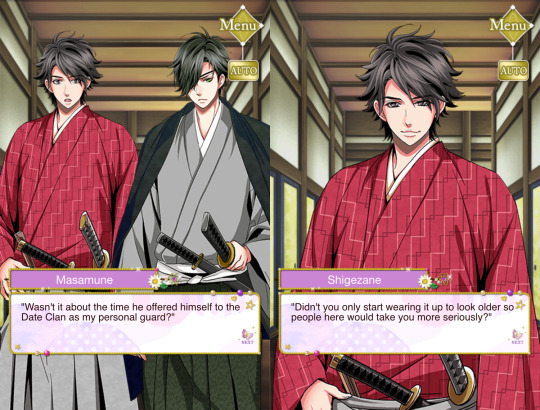
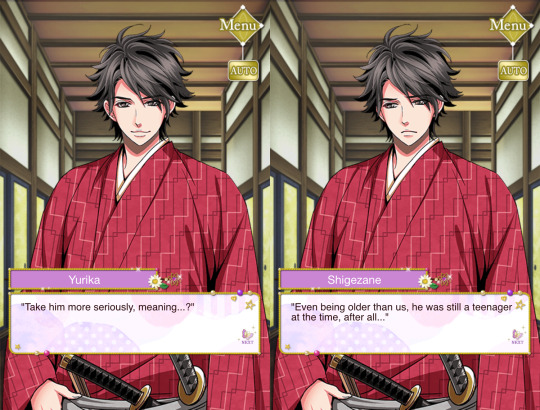
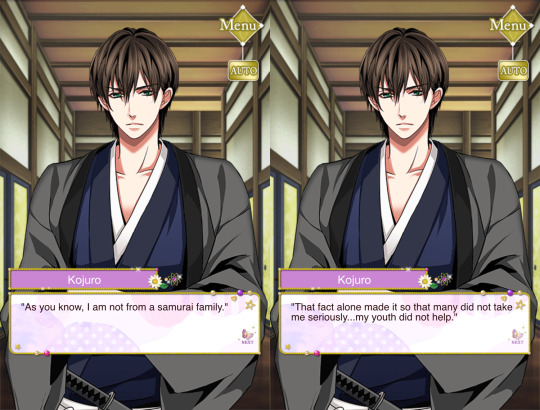

It has been mentioned as well but Kojuro wasn’t the man we know today when he was still a young adult; Shigezane and Masamune said that he was hardly holding himself back and was able to throw savage tantrum and he could be even more terrifying since he is the kind to dig in and find some juicy stuff to get back at you and literally destroy you. (Mentionned and proved in Our Sultry Night of Passion event and also shown in Noble Heart Exposed event). Kita even said once that Kojuro was a “rebel” and didn’t actually wanted to work for the Date clan (and Kojuro low key confirmed it actually happened).
Kojuro explained himself that he basically compartmentalizing with his private and public persona. I don’t know if we can say that he is really a lazy person, or depends on what I suppose, but it’s certain that he sucks at tidying up his room, he tends to buy more than one copy of a book, barely fold his own clothes, is really clumsy when it comes to cooking (he even asked for Shigezane to bring him so food once since he was too lazy to even try) and don’t bother to eat sometimes because of that or he isn’t a morning person and can sleep in his study without sleeping in his bedding… He is actually ashamed of these (which he label them as things that aren’t his “strong points”) but can’t help himself; it’s part of him whatever happens, even though he tries his best to change.

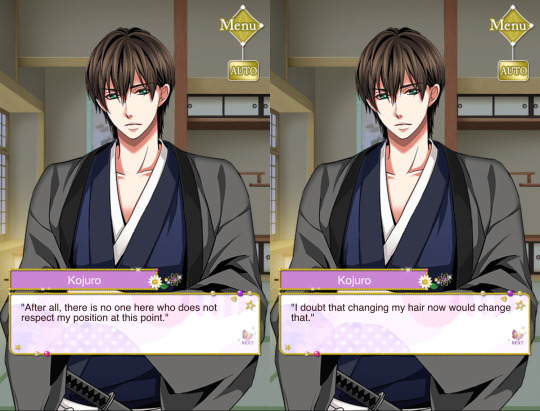


It’s interesting as well because in the AU events in KoiRan where Kojuro is there being younger, Kojuro was really the kind not to care much for people, giving him the attitude of a very detached and not very altruistic person. (I can’t give much examples but if I’m not saying something wrong, in one event, Kojuro was asked by Shigetsugu to help the MC find where she was supposed to be working at the new place she was assigned in the city but he didn’t even bothered to do it correctly.)

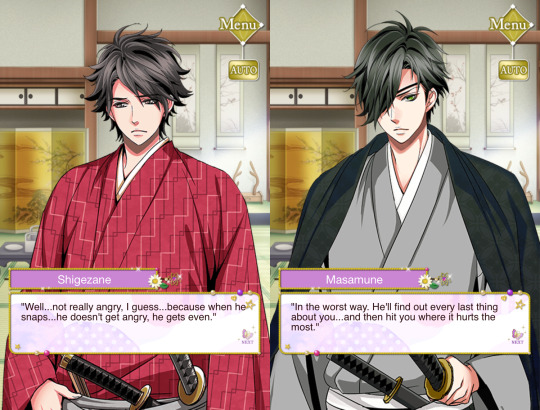

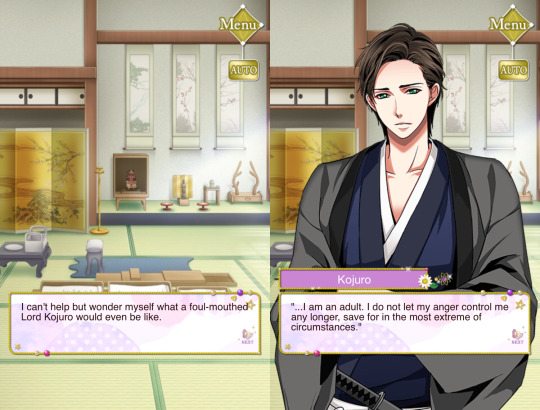
I’m going to talk about how he behave with his closest relationships because it’s really interesting. When he started serving Masamune, it was “Kojuro’s mistake” that Masamune’s eyesight got worse (it is still unconfirmed but that’s what Kojuro believes) because he failed to found out about the poisoned manju (as told in Claim Me at Last event). Although at first it says that it’s because of this guilt that Kojuro became even more loyal to Masamune (and thus making sure he wouldn’t allow himself to make anymore grave mistake), but Kojuro explains that it isn’t really why it made him even more protective of Masamune (I’m sure it was during one of Masamune’s event but I can’t remember which one but I don’t remember his exact reason, I’m sorry). Kojuro, as much as he loves Masamune, still puts a barrier between the two of them and don’t even dare to call him a friend (I wonder if it was during Masamune’s Unspoken Ties event but I don’t have it so I can’t be sure) which bother Masamune a lot since not only he sees him as his most loyal retainer, but also a dear friend and big brother figure. Kojuro has always put some distance with his peers even though he is very friendly and easy to talk to and I’m going to explain why I think he does that now.


We hardly talk about it but it’s important to remember that Kojuro, even though got taken care of by Kita and he himself says that he sees her as a motherly figure, still lost his parents at a young age and even waited for them to return (it’s never been mentionned how they died though). It’s implied that he missed some of this parental love and he wishes for his children not to know the same fate as he had with his own. He had actually a difficulut childhood (mentionned in the special ending of his second Main Story in KoiRan) and felt very lonely, I believe he lacked love for a long time so that’s why I’m going to talk about the way he was behaving with his preivous romatic relationships now.


Kojuro said that he had numerous lovers before the MC (The Bonds of Love Kojuro’s epilogue and Blossoming Lies events) but he never really fell in love with them. I believe that, since Kojuro always had a hole in his heart, he tried to fill this gap but never found someone to fit there (until the MC came in his life of course, he changed a lot after realizing his genuine love for her). He was going out with them for a while until they broke up (it’s not really told but it’s implied that he is the one who decided to) and I believe it was only because he never truly loved them and just wanted to feel some kind of strong affection even though it wasn’t shared (and certainly because he just wanted to relieved himself of his own earthly desire as he said so himself).

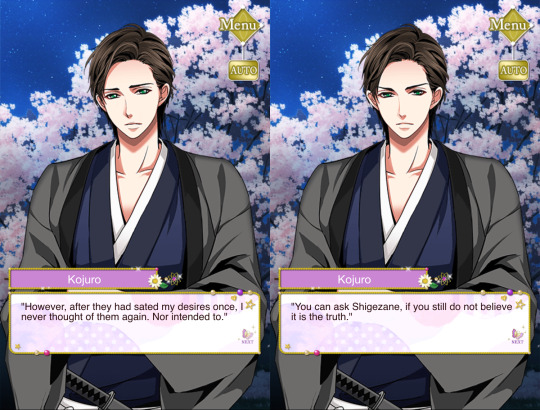
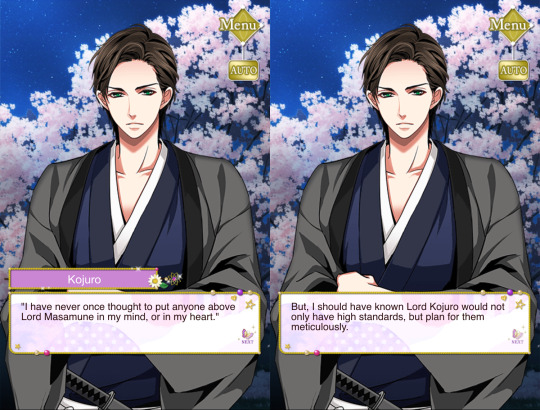
The latest event shows another side of him I would love to talk about because it could be confirming even more about the fact that Kojuro might have some kind of trust issues. Kojuro always took upon himself to serve not only Masamune personally but the Date clan and Oshu itself and thus, taking care for the problems was a normal thing to do. So when he realized that some of his retainers had difficulties to solve some problems in Shiroishi, he wanted to care of them himself like he always did. I think that the reason that it’s difficult Kojuro to let people do their job is only because he was in this position before and is probably to used to solve them but also because he has perfectionist tendencies. But not only this, it’s been shown that Kojuro can very stubborn, like REALLY when he wants to but can also thing that bothering for himself. We’re all used to have a Kojuro being able to commune his thoughts and feeling pretty easily and yet, sometimes he keeps stuff for himself even thought he knows he should be talking about them for different reasons and been mostly seen again in his second Main Story in KoiRan. It can be even more frustrating coming from someone you know that can, and more importantly want to make sure he is listened and understood.
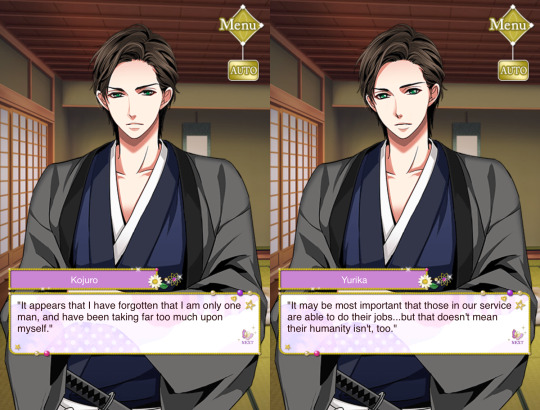

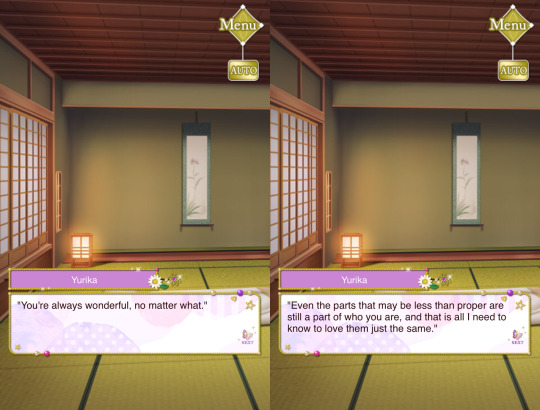
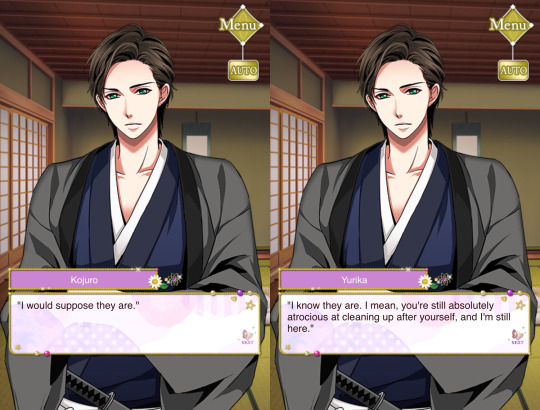
All of these might not really be seen as evident flaws like it’d be with Saizo’s uncommunicativeness or Ieyasu’s trust issues but they really are stuff that are overlooked and overshadowed by his qualities and it’s actually normal. It doesn’t make him any less human; Kojuro is just working his butt to better himself in the eyes of other but more importantly in his own. He is just a perfecionnist and really don’t like to be seen as someone who can’t control his own emotions (he said a couple times that he always make sure to control his anger or even his lust, for example) and trust me, that’s the behavior of someone who don’t allow themselves to make any mistake or accepting failure and are even harder on themseleves than on others (such as the exemple of his lastest event, Diary of a Samurai Wife); he wants everything to be done nicely and quickly and so want to do it himself but realize that it was wrong to do this in the end.
#anonymous#ask#samurai love ballad party#slbp#i would like to apologize for my english too alkjfdkld#i'm actually dead after writing all of this#i hope i was able to explain things correctly...#slbp kojuro
56 notes
·
View notes
Link
The Logic, Wisdom and Scientific Evidence for the Homeopathic Treatment of Influenza none By Dana Ullman, MPH, CCH This is the time of year that Big Media seeks to appease its biggest advertisers, Big Pharma, by helping to spread fear and panic about this year’s “flu epidemic.” They commonly quote sensationalized statistics, suggesting that you will die or become very ill unless you vaccinate. However, conveniently enough, even the Lung Association admits that the vast majority of these deaths associated with the flu are not from this illness at all but from pneumonia.1 This merging of statistics is rare in medicine or science, except when the economics of Big Pharma (or another big industry) are involved, as their bible seemingly becomes “Lies, Damn Lies and Statistics” (in other words, how to use statistics to create fear and sell drugs). The fact that last year’s flu vaccine was a dismal 42 percent effective2 is completely ignored by the media, though the 2014-15 flu vaccine was only 23 percent effective (and not surprisingly, virtually no major media reported on this fact). The real problems from getting the flu are not from the disease itself but from the mismanagement of the disease by doctors and by patients. People with the flu mistakenly take aspirin or acetaminophen to “lower the fever” of the flu, but that is one of the worst things that you can do for yourself, unless one happens to have a fever with a high temperature of 103 degrees Fahrenheit or more (a very rare experience, except in infants). Generally, physicians and pathologists consider a fever to be one of the important defensive functions of the body. The fever is one of the methods that your body deploys to fight viral infection. During a fever, the body secretes increased amounts of interferon, an antiviral chemical. If a person takes a fever-lowering drug, the body doesn’t secrete this antiviral chemical as much, enabling the virus to overwhelm the sick person. It is almost as though physicians don’t respect the “wisdom of the body.” Instead of using those conventional drugs to suppress a fever, a good physician or healer will help augment the person’s natural defenses to aid the resolution of the infection. The real reason that the flu epidemic of 1918 to 1919 killed so many people was not simply because of this viral infection but because a relatively new drug, called aspirin, was used in large amounts.3 New York City was found to have one of the lowest mortality rates from the flu than any major city in the U.S.,4 in part because the health commissioner of New York City was Dr. Royal Copeland, a homeopathic physician who discouraged the use of aspirin and encouraged safer natural methods, including homeopathic medicines.5 Copeland was later elected senator for the state of New York three times, and he wrote the famed Federal Food, Drug and Cosmetic Act of 1938, which was one of the most important consumer rights laws ever written because it empowered the U.S. Food and Drug Administration (FDA) to regulate drugs — and it also gave federal recognition to homeopathic medicines as “drugs.” The Wisdom, Logic and Scientific Evidence for Homeopathy and the Flu It is generally recognized that living organisms, including the human body, will go to extraordinary measures to survive. In doing so, it can and will create symptoms as defenses and as adaptive measures to fight infection or stress. When the human body is exposed to a flu virus, the body inflames into a fever as a defensive effort to fight the virus. During a fever, the body increases its number of T-cells and B-cells that help fight viral infection. The wisdom and logic of homeopathic medicines are that instead of suppressing symptoms with fever-lowering drugs, a nano-dose of a medicine that might actually cause a fever or flu-like condition will be used to augment the person’s immune and defense system. It is therefore no wonder that the first scientist to be granted the Nobel Prize in Medicine was Dr. Emil Adolf von Behring who discovered the tetanus and diphtheria vaccines. After he won this Nobel Prize, von Behring admitted that his discovery was inspired from homeopathy.6 Even though the extremely small nano-sized doses were considered impossible or improbable to have any biological effects, today the emerging field of nanomedicine and nanopharmacology is verifying the significant power of nano-doses of medicines. A 2015 report about the field of nanomedicine expected sales to be over $130 billion.7 It is only a matter of time before physicians, scientists and the general public realize that homeopathy was the “original nanomedicine.” The bottom line is that our body’s hormones and cell-signaling agents are known to operate at nano-dose levels.8 Further, solid research published in one of the most respected scientific journals in the world, the American Chemical Society, has confirmed that homeopathic doses, even those at extreme dilutions, have significant amounts of nano-doses as verified by three different types of spectroscopy.9 Homeopathy as a Form of Homeo-Immunotherapy Generally, homeopathic medicines are not prescribed for specific diseases but instead for specific syndromes of each disease. For instance, the syndrome of symptoms one person with the flu may have (fever, body aches and a frontal headache worsened by all types of motion, increased thirst for cold fluids and irritability with a desire to be alone) will require a different homeopathic medicine from another (who may have a fever, great fatigue, a headache in the back part of the head and no thirst). In fact, from a homeopathic point of view, it is strange and weird that people would think it is wise to use the same drug to treat everyone, even though people with the same illness may have totally different syndromes of symptoms. However, in homeopathy, there are select conditions for which certain specific homeopathic medicines can be effective for larger groups of people despite their differences in symptoms. The use of a homeopathic medicine called Oscillococcinum is an example of a remedy that can be effective for many people with the flu, though clinical experience suggests that it is most effective when used within 48 hours of getting flu symptoms. Although most homeopathic medicines are made from the plant or mineral kingdom, Oscillococcinum is unusual in that it is made from the heart and liver of a duck. Although this source may initially sound strange, it makes sense for anyone familiar with how influenza is spread throughout the world. Epidemiologists have determined that various birds, including ducks, carry influenza viruses in their digestive tracts. Most people today have heard of the “bird flu,” and this fact makes reference to this common source of the flu. The fact that homeopaths have used Oscillococcinum since 1925 verifies that homeopaths have incorporated this accurate and cutting-edge medical information for almost a century, considerably ahead of modern medicine. Ultimately, people who use this homeopathic medicine are therefore being given exceedingly small doses of various flu viruses, making this medicine a type of homeo-immunotherapy. Scientific Evidence That Homeopathy Works for the Flu There are several scientific studies published in peer-reviewed medical journals that have confirmed Oscillococcinum’s efficacy. One large study of 487 patients found that almost twice as many patients who were given Oscillococcinum recovered from the flu within 48 hours as those given a placebo (17 percent versus 10 percent).10 What was particularly remarkable about this study was a short report written about it in the Lancet. Their headline was “Quadruple Blind Study.”11 Because most physicians and educated consumers are familiar with “double-blind” studies, very few people don’t know what is meant by “quadruple blind” studies. The Lancet article posed the question: What would happen if the reader of the study was blinded to the results of it? They then described the study without mentioning what treatment was given, and then they described the significant results that verified the positive results of treatment. The Lancet then posed the provocative question: Now, how do you feel about these results when you are informed that the treatment used was a homeopathic medicine? The author of this article in the Lancet also happened to mention that “a 7 percent difference in efficacy as defined would be a respectable proportion in most drug trials.” A different group of researchers conducted a randomized, double-blind study involving 372 patients (188 treated with Oscillococcinum and 187 with placebo) of both sexes, ranging in age from 12 to 60, who presented rectal temperature ≥ 100.4 F, muscle pains, headache, or at least one of the following symptoms: shivering, chest pain, spine pain, coughing, irritation of nasal mucosa or feeling of malaise.12 Patients received three tubes of Oscillococcinum or placebo each day (morning, noon and night) for three days. The results of this trial show a highly statistically significant difference between the two groups, for what concerns disappearance of symptoms after 48 hours (19.2 percent in the Oscillococcinum group versus 17.1 percent in the placebo group) and improvement in symptoms (43.7 percent vs 38.6 percent for placebo) ) (p = 0.0028). Moreover, the frequency of use of concomitant medicines was slightly higher for the placebo group, as was also the use of multiple medicines. Only 13.8 percent of the Oscillococcinum group used two or three drugs (analgesics and antirheumatics), against 19.6 percent in the placebo group. Another parameter considered was the percentage of patients able to return to work, which was higher in the Oscillococcinum group, both two days after the onset of the illness (16.3 percent against 9.3 percent) and after four days, with highly significant differences. Homeopathic Treatment Reduced Length of Influenza Illness The Cochrane Collaboration is an internationally respected group of researchers who evaluate scientific studies. In 2004, they reviewed seven studies using Oscillococcinum in the treatment or prevention of influenza.13 Four treatment trials (n = 1,194) and three prevention trials (n = 2,265) were evaluated. Only two studies had sufficient information to complete data extraction fully, and both of these studies only evaluated the use of this medicine in the treatment of influenza or influenza-like conditions (the two studies mentioned above were the two studies that were evaluated). Oscillococcinum treatment reduced length of influenza illness by 0.28 days (95 percent confidence interval 0.50 to 0.06). Oscillococcinum also increased the chance of a patient considering treatment effective (relative risk 1.08; 95 percent CI 1.17, 1). This review also concluded that the number of days needed to return to work were significantly reduced by 0.49 days (95 percent CI 0.89-0.08) compared to the control (average of 4.1 days). The relative risk from treatment was 0.60 (0.37-0.98), meaning that the proportion of patients treated with Oscillococcinum who considered the treatment to be useless was 0.6, relative to 1.0 for the placebo (a significant difference of 40 percent). The authors of this research review considered these results “promising,” though not strong enough to warrant a general recommendation to use Oscillococcinum for “first-line” treatment of influenza or influenza-like syndromes. As for the use of Oscillococcinum in the prevention of the flu, the researchers concluded that it was not effective. However, it should be highlighted that the company that makes Oscillococcinum does not market this medicine for “prevention” of the flu, only for the treatment of it (and for “influenza-like” syndrome). In 2012, a new analysis of research on Oscillococcinum in the treatment of influenza was conducted by the Cochrane Collaboration, and their conclusion was more conservative than previous analyses by this organization.14 The 2012 analysis concluded, “Although the results from four other clinical trials (total of 1196 participants) suggested that Oscillococcinum relieved flu symptoms at 48 hours, this might be due to bias in the trial methods.” In other words, even though two of these studies were double-blind, randomized and placebo controlled, these studies did not achieve the higher caliber of standards of research, thereby enabling the possibility of bias in the results. It should be noted that around 99 percent of clinical studies conducted today and published in peer-reviewed medical journals would also be deemed to have some degree of the “potential for bias.” Other Studies on Homeopathic Medicines Homeopathic medicine is impressively popular amongst physicians in Brazil. In fact, there are 15,000 physicians in Brazil who specialize in homeopathy, making it the 16th largest group of physicians of the 61 medical specialties.15 It is further impressive to note that various Brazilian public health agencies have studied the efficacy of homeopathic medicine and have advocated for its usage. Studies on the use of homeopathic medicine in the treatment of dengue fever have found remarkably positive results,16 which is particularly important because conventional medicine offers so little. A pragmatic clinical trial on preventing influenza was conducted in the Brazilian Public Health System in Petrópolis (a major city in Brazil) with children aged from 1 to 5 years old.17 The medications used were mainly selected based on in vitro experiments (InfluBio, which is a homeopathic dose, 30X, of influenza virus [A/Victoria/3/75 (H3N2)]), and in successful qualitative clinical experiences (Homeopathic Complex composed of Streptococcus and Staphylococcus and inactivated influenza virus in a 30X dilution). Following informed parental consent, subjects were randomly distributed, in a blind manner, to three experimental groups: Homeopathic Complex, placebo and InfluBio. Brazil public health officials collected flu and acute respiratory infection symptomatic episodes monthly following the established protocol. The number of these episodes was registered in one year (2009 to 2010). Out of the 600 children recruited, 445 (74.17 percent) completed the study (149: Homeopathic complex; 151: Placebo; 145: InfluBio). The number of flu and acute respiratory infection symptomatic episodes detected in this clinical trial was low; however, it was different between homeopathic groups and placebo (p < 0.001). In the first year post-intervention, 46 out of the 151 (30.5 percent) children in the placebo group developed three or more flu and acute respiratory infection episodes, while there was no episode in the group of 149 children who used Homeopathic Complex, and only one episode in the group of 145 (1 percent) children who received InfluBio. The researchers concluded that the use of homeopathic medicines minimized the number of flu and acute respiratory infection symptomatic episodes in children, signalizing that the homeopathic prophylactic potential should be investigated in further studies. In the U.S., no formal studies have been conducted testing homeopathic doses of influenza viruses in the prevention of the flu. However, a popular protocol derived from European experiences have utilized Influenzinum 9C, using an annually changing formula of the three most common flu viruses. Typically, a five-dose regiment is recommended, taking one dose a week for four weeks and then taking a fifth dose one month later. Although no clinical studies have been conducted testing homeopathic doses of Influenzinum, there has been one basic science in vitro study of Influenzinum 30C.18 In this study, the cellular alterations induced by Influenzinum 30C were analyzed by optical and electron microscopy, MTT and neutral red assays. Glycolytic metabolism (PFK-1) was studied by spectrophotometric assay. Additionally, the production of tumor necrosis factor-α (TNF-α) by J774.G8 macrophage cells was quantified by ELISA before and after infection with H3N2 influenza virus and treatment. Influenzinum was not found to cause cytotoxic effects but induced morphological alterations in Madin-Darby canine kidney (MDCK) cells. After 30 days, a significant increase (p < 0.05) in mitosis rate was detected compared to control. MDCK mitochondrial activity was changed after treatment for 10 and 30 days. Treatment significantly diminished (p < 0.05) PFK-1 activity. TNF-α in biotherapy-stimulated J774.G8 macrophages indicated a significant (p < 0.05) increase in this cytokine when the cell supernatant was analyzed. The researchers concluded that Influenzinum 30C altered cellular and biochemical features of MDCK and J774G8 cells. Other Homeopathic Medicines for Influenza • Gelsemium (yellow jessamine): When fatigue and a generalized heavy, weak feeling pervade the person, even leading to trembling of individual parts and to having heavy, half-open eyelids, this remedy may help. These people tend to have little or no thirst, can experience chills up and down their spine, and have a headache in the back part of their head. • Bryonia (white bryony): People who have marked body aches during the flu that are aggravated by any type of motion may be helped by this remedy. Generally, these people also have a headache in the front part of their head that is also aggravated by motion. They have dry, even chapped lips, a dry cough, and a great thirst for cold water. Despite being warm, they are averse to warm rooms. People with the flu who are very irritable and insist upon being left alone tend to benefit from this remedy. • Eupatorium perfoliatum (boneset): People with the flu who experience aches in the muscles and pains in the bones and/or in their eyes often benefit from this remedy. Another characteristic symptom of people who might find benefit in this remedy is chills that occur in the morning, especially 7 a.m. to 9 a.m. These people desire cold drinks, even during a chill and even though it may elicit a chill response, and they feel better lying on whatever part of their body is aching. • Rhus toxicodendron (poison ivy): This remedy has been found useful for people with muscle aches that are aggravated by initial motion but relieved by continued motion. These people are often very restless, especially at night in bed, tend to have a sore throat and are very thirsty but only for sips of water at a time. If a cold sore develops during the flu, some people may want to consider this medicine. • Arsenicum album (aka white arsenic): This highly diluted solution is an important medicine for people with the stomach flu who experience nausea and vomiting along with a fever. These people are sensitive to and worsened by exposure to cold. They experience a great thirst but only for sips of water at a time. They feel restless and anxious, usually worrying if they might actually be sicker than they are, and they may seek several professionals’ opinion on their condition. They feel better with company around, and they feel the worst at or near midnight. Note: Do not attempt to mix this yourself, as it must be properly and scientifically prepared to be safe and effective. The above homeopathic medicines are commonly used in the 6X, 6C, 12X, 12C or 30X, 30C potencies.
0 notes